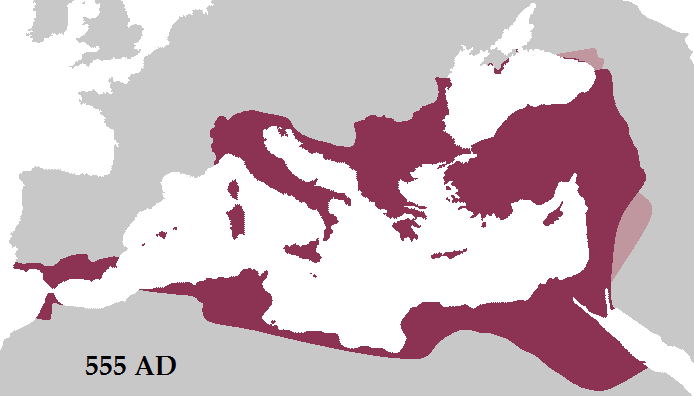
Byzantine Empire 555AD
Questioning Separation Religion-State
Continued from Exploring Deism Its Origins and History:
The real argument over Deism involves modern politics and the intention of the Founders. On the one side Christian fundamentalists want the Founders identified with themselves to bolster their claim the Bible is the foundation of America. On the humanist side it's simply an effort to continue to dismantle American culture and its foundation in order to substitute their own pseudo-religious beliefs.
The atheistic French "Deists" despised all religion and so does their offspring commonly known as humanists. But was the views of Voltaire the same views of first six American presidents that held deistic views? Not at all. So their Humanist offshoots want this abstract notion of 'god' defined in the most remote and indifferent form possible, little different in real terms to their own atheism.
There is no such term as 'separation of church and state' in the Constitution or any other founding documents. The Founders intentions were to protect individual liberty and freedom of conscience, not create an atheist society devoid of even the mention of God in public.
The Bill of Rights refers to religion and not church, so Humanistic pseudo-religious belief systems such as Marxism, New Age environmentalism, etc. are clearly covered if it concerns the issue of the state interfering in the free exercise of religion or freedom of conscience.
Simply creating a state sanctioned void so secular pseudo-religious philosophy can be inserted is indeed a violation of freedom of religion and conscience. There is no "right" not to be offended or exposed to ideas one rejects either way. The closest we have on the subject was Jefferson's Wall of Separation so many like to quote out of context.
The Baptists in Danbury Connecticut feared persecution by Congregational Church if it became a national church. To quote the Danbury Baptists, That Religion is at all times and places a matter between God and individuals -- That no man ought to suffer in name, person, or effects on account of his religious Opinions. That would upset some fundamentalists.
Jefferson responded, Believing with you that religion is a matter which lies solely between man and his God; that he owes account to none other for his faith or his worship; that the legislative powers of the government reach actions only, and not opinions...the whole American people which declared that their legislature should 'make no law respecting an establishment of religion, or prohibiting the free exercise thereof,' thus building a wall of separation between church and State.
By banning from public expression the beliefs of Christians and Jews, while pandering to every other belief system including Islam in California public schools or environmental religion, this is clearly a violation of the intention of the Constitution.
Also see Thomas Jefferson's Wall of Separation This refers to freedom of conscience, not banning any mention of God on public property, which violates the freedom of conscience of most people. To further quote Jefferson to put this in context, I consider religion a supplement of law in the government of man. Jeffersonian Cyclopedia, Foley 1900 (#7242)
And to quote John Adams, Our Constitution was made only for a moral and religious people. It is wholly inadequate for the government of any other. This is far more than paying homage to Voltaire's "clock maker" god.
For the full text see Existence of Deity/God by Thomas Jefferson
This was written in 1823 to John Adams a year before their deaths on July 4, 1824. This is Nature's God Jefferson wrote about in the Declaration of Independence. Indeed he is correct and rejected by name Spinoza (pantheist not a Deist), Diderot (French deistic atheist) and D'Holbach (atheist) often claimed as "deists" by so many "deism" websites. Jefferson and Adams obviously believe in an active, but non-controlling God, not what passes for the dictionary definition of Deism today.
Also see Thomas Jefferson and a Reasonable Deity. Here he not only supported an ongoing and continuous process, but a continuation of limited Divine intervention. The origin of the term "Nature's God" wasn't invented by Jefferson, but referred to Blackstone's Commentaries on the Law. Blackstone's was the main textbook for Law Schools in America until 1920 and Jefferson was a lawyer.
To reiterate Nature and Nature's God had nothing to do with Deism as claimed by many "deism" websites. Blackstone was a Christian.
See Blackstone's View of Natural Law
- Exploring Religion Modern and Ancient 1
- Among the Goths and the Jews
- Overview Byzantine-Eastern Christian Empire
- Byzantine-Persian Conflict
- Religion in the Persian Sassanid Dynasty
- Eastern Roman Empire by Turgut Ozal
- Why did the Apostles Reject Paul?
- When Christianity Pushed Back Muslim Attacks
- Islam the Demise of Classical Civilization
- Koran Origins by Ibn Warraq
- Why Muslims Can't Build a Lightbulb
- Mohammed the Man Islamic Ideology
Religious Articles Index
Origins Christianity